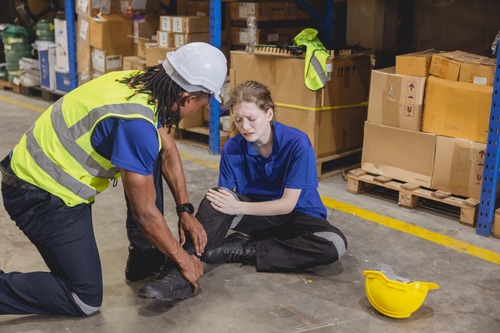At 1Charlotte Injury Lawyers, we focus on helping injured workers across North Carolina. Our team has extensive experience handling workers’ compensation claims, personal injury cases, and car accident disputes. We guide clients through every step of the legal process, from filing claims to securing medical care and rehabilitation benefits. We offer free consultations and work on a contingency fee basis, so you pay nothing unless we win your case.
Workplace injuries can affect every part of a person’s life. From physical pain to time away from work, recovery often depends on access to proper injury rehabilitation. In North Carolina, the workers’ compensation system provides medical treatment and support to help injured employees heal and return to their jobs. This includes services like physical therapy, pain management, and vocational rehabilitation. Understanding how these benefits work and how to access them is essential for a full recovery.
In this blog, we explain how injury rehabilitation works under North Carolina workers’ compensation law, outline the key services available to injured workers, and show how working with an experienced Charlotte workers’ compensation attorney can help protect your rights and support your recovery.
Understanding Injury Rehabilitation in the Context of Workers’ Compensation
Injury rehabilitation is a key part of recovery after a workplace injury. It helps employees return to work and daily life by restoring physical and functional ability.
What Is Injury Rehabilitation?
Injury rehabilitation is a medical process that supports the recovery of the body after a work-related injury. It includes treatments for musculoskeletal injuries, soft tissue damage, and occupational diseases. Common services include physical therapy, pain management, rehabilitation nursing, and speech therapy. The goal is to decrease pain, improve joint range of motion, and help the patient perform movements needed for work and life.
Key Treatments and Services
Rehabilitation often begins shortly after an acute injury or surgical intervention. Physicians may recommend a combination of physical therapy, stretching techniques, and equipment-based exercises. These treatments help prevent muscle atrophy, restore aerobic capacity, and support healing of the injured area.
Proper rehabilitation can involve orthopedic surgeons, sports medicine specialists, and occupational therapists. Each plays a role in developing a treatment plan that supports recovery and reduces the risk of re injury.
Rehabilitation for Different Injury Types
The type of rehabilitation depends on the injury. For example:
- Musculoskeletal system injuries may need functional rehabilitation and strength training.
- Tissue injuries may benefit from treatments that use the healing properties of movement and pressure.
- Occupational diseases may require long-term support and careful monitoring by medical providers.
Every injury rehabilitation program is designed to restore the person’s ability to work or manage simple activities of daily living.
Importance Within Workers’ Compensation
Under North Carolina’s workers’ compensation system, injured employees may receive medical care that includes injury rehabilitation. This care must help the employee recover and, if possible, return to work. According to N.C. Gen. Stat. § 97-2 and § 97-25, employers must provide medical treatment that supports recovery from a work-related injury or illness.
Rehabilitation is a covered benefit when it is necessary to promote healing and improve function. The workers’ compensation system supports access to care that helps the employee reach their maximum level of improvement.
How Rehabilitation Helps Workers
Injury rehabilitation helps the body recover, rebuilds strength, and restores movement. It gives injured employees the tools to return to their job or adjust to a new one. A structured rehabilitation process can shorten recovery time and reduce long-term disability.
Legal Framework for Rehabilitation Under NC Workers’ Compensation Law
North Carolina workers’ compensation law outlines the rules that ensure injured workers receive proper rehabilitation support after a workplace injury.
Statutory Authority for Rehabilitation Services
North Carolina General Statutes § 97-25 and § 97-25.5 require employers to provide medical care that helps reduce the effects of a workplace injury or illness. This includes injury rehabilitation services such as physical therapy, pain management, and vocational rehabilitation. The law is designed to help injured employees recover faster and return to productive work.
Employer Responsibilities
Employers must ensure that employees have access to medical providers and rehabilitation programs approved by the workers’ compensation system. This includes paying for treatment related to musculoskeletal injuries, occupational disease, and tissue injury. If rehabilitation services are recommended by the treating physician, the employer must authorize and fund them.
Role of the North Carolina Industrial Commission
The North Carolina Industrial Commission monitors and enforces the rules around workers’ compensation and rehabilitation. The Commission reviews treatment plans, resolves disputes, and approves vocational rehabilitation counselors. It plays a central role in making sure rehabilitation is timely, necessary, and beneficial to the injured employee.
Workers’ Rights to Medical and Functional Rehabilitation
Injured workers are entitled to care that promotes healing and supports their ability to return to work. This includes functional rehabilitation, therapy for the injured area, and training to perform daily tasks. If access to care is delayed or denied, the worker can seek a hearing to enforce their rights under the law.
Components of a Comprehensive Injury Rehabilitation Plan
A complete injury rehabilitation plan includes several elements that support physical recovery, pain reduction, and return to work.
Medical Treatment and Pain Management
Rehabilitation starts with medical treatment. This may include visits to orthopedic surgeons, sports medicine doctors, or general physicians. Pain management is often part of this phase. It may involve medications, injections, or supervised therapy to decrease pain and control inflammation in the injured area.
Physical Therapy and Functional Recovery
Physical therapy is a core part of the rehabilitation process. It helps restore joint range of motion, rebuild muscle strength, and improve aerobic capacity. Functional rehabilitation focuses on helping the injured person perform movements that are necessary for work and daily living. This may include stretching techniques, strengthening routines, and mobility training.
Use of Equipment and Supportive Tools
Rehabilitation programs may use specialized equipment to support healing and movement. Tools such as resistance bands, stability balls, or mobility aids help patients regain control and stability. These tools are often combined with supervised exercises to improve function across the whole body and prevent re injury.
Role of Specialists and Coordinated Care
Injury rehabilitation often requires a team approach. Physicians, physical therapists, occupational therapists, and rehabilitation nursing staff work together to develop a plan. Each specialist focuses on a different part of the recovery. This team approach helps address all aspects of the injury and supports a more complete recovery.
Monitoring Progress and Adjusting the Plan
Rehabilitation plans are adjusted based on the patient’s progress. Providers track improvements in movement, strength, and pain levels. If progress slows, the plan may be updated to include new therapy options or surgical intervention if needed. The goal is to reach the highest possible function and prepare the worker for a safe return to the job.
Role of the Workers’ Compensation Attorney in Injury Rehabilitation
A workers’ compensation attorney plays a key role in helping injured workers access and protect their right to injury rehabilitation services.
Securing Access to Rehabilitation Services
A workers’ compensation attorney ensures the injured employee receives the full range of treatment allowed under North Carolina law. This includes physical therapy, pain management, rehabilitation nursing, and vocational rehabilitation. Attorneys help confirm that the treatment is approved and paid for by the employer’s insurance company as required by N.C. Gen. Stat. § 97-25.
Protecting Legal Rights During Recovery
Injured workers may face delays, denied claims, or limited access to proper rehabilitation. A workers’ compensation attorney can file motions, request hearings, and present medical evidence before the North Carolina Industrial Commission. This helps ensure that the worker receives necessary care without interruption.
Guidance Through the Rehabilitation Process
The rehabilitation process can involve multiple providers, reports, and deadlines. Attorneys guide clients through these steps and help them follow medical instructions that affect their benefits. This support helps workers avoid mistakes that could harm their case or slow their recovery.
Advocating for Long-Term Outcomes
Attorneys also help injured workers secure long-term support if recovery is slow or the injury leads to permanent restrictions. They work to ensure access to vocational rehabilitation if the worker cannot return to their previous job. This can include job placement services, skill training, or education programs that support a safe return to work.
Why 1Charlotte Injury Lawyers Can Help
Our team at 1Charlotte Injury Lawyers focuses on helping injured workers throughout North Carolina. We understand how injury rehabilitation fits into the larger workers’ compensation process. Our attorneys help clients secure proper treatment, fight claim denials, and make sure the rehabilitation plan meets the legal standards. We bring experience and local knowledge to every case, making us a reliable resource for injured workers who need help during recovery.
Contact an Experienced Charlotte Workers’ Compensation Lawyer Today!
If you’ve suffered a workplace injury and are struggling to get the rehabilitation care you need, our team at 1Charlotte Injury Lawyers is here to help. Injury rehabilitation is a critical part of your recovery, and you should not have to fight alone to receive the benefits you are entitled to under North Carolina law.
Contact us at (704) 706-2689 for a free case review today!






